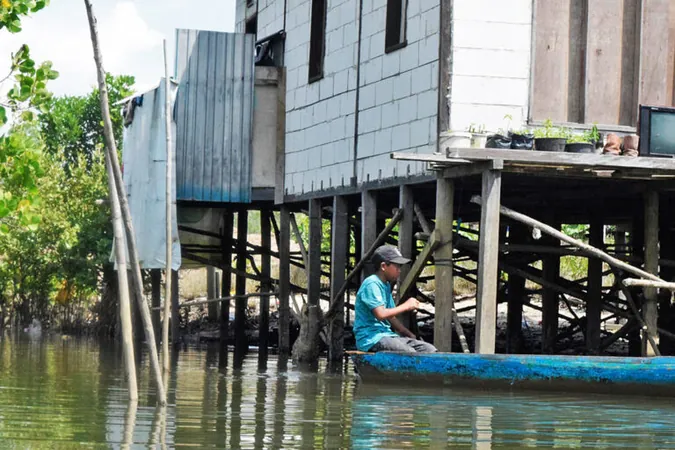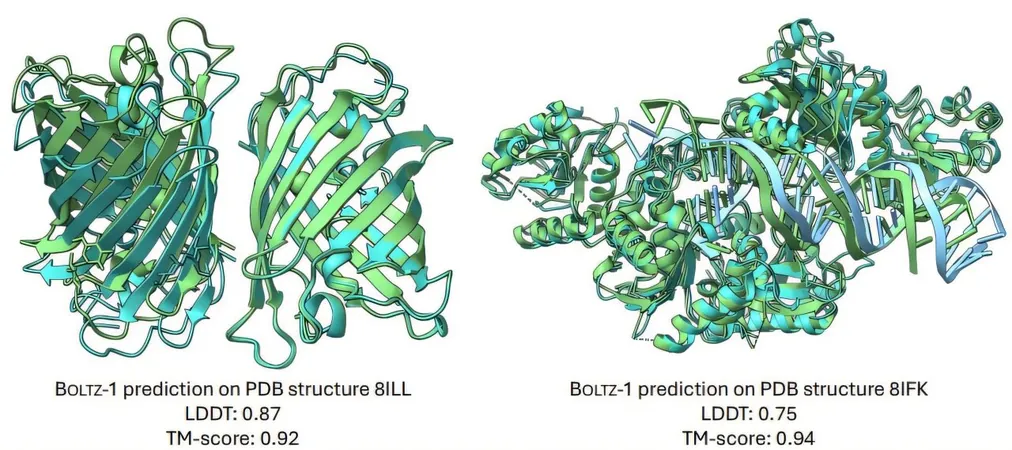
Building a New Capital: How Indonesia's Fisheries Face Extinction Amidst Port Development
2024-12-10
Author: Daniel
Introduction
BALIKPAPAN, Indonesia — Abdul Kadir gazed somberly at the gathering storm clouds above Balikpapan Bay, foretelling yet another day of challenging fishing conditions.
“We’re often faced with this situation,” Kadir lamented. “But we survive as best we can.”
The Community of Jenebora
In the coastal village of Jenebora, home to a vibrant community of nearly 3,500 residents, fishing is not just an occupation; it's a way of life. Predominantly inhabited by ethnic Bajau and Bugis individuals alongside Javanese migrants and Indigenous Dayak Pesisir families, the village is steeped in tradition. However, for Kadir and his fellow fishers, the future looks grim. With a small one-ton boat, venturing beyond the confines of Balikpapan Bay is simply not an option.
The Decline of Fishing
Historically, a successful fishing day could yield up to 40 kilograms (about 90 pounds) of fish and shrimp, translating into earnings of roughly 6 million rupiah ($380). Yet, Kadir observed a troubling decline in both fish catches and market prices in recent years. “There’s been a decline in catches and price,” he pointed out.
The downturn started in the mid-1990s when coal and timber companies began extensive operations in the bay. A turning point came in 2012 with the establishment of the Kariangau Industrial Estate, which exacerbated the situation. A disastrous oil spill in 2018, caused by a ruptured pipeline from the state-owned Pertamina, only compounded these issues, killing five people and devastating local marine life.
Impacts of Nusantara Development
Today, as the Indonesian government presses forward with an ambitious project to build a new capital city—Nusantara—construction activity is posing further threats to this delicate ecosystem. Announced in 2019 by then-President Joko Widodo as a way to alleviate Jakarta’s congestion, the new capital is strategically located on Borneo's eastern coast, approximately 1,200 kilometers (745 miles) away from the current capital. Despite delays and skepticism regarding the project's feasibility, the port traffic in Balikpapan Bay has surged.
"There are more and more ships passing through Balikpapan Bay now," Kadir remarked. The presence of commercial vessels has severely restricted local fishers' access to prime fishing grounds, as these areas have been marked for development, leaving many fishers with dwindling opportunities.
Environmental Concerns
As marine development escalates, the clearing of mangroves has begun to threaten the marine ecosystem. Mangroves serve as critical habitats for various aquatic life, and the loss of these vital areas has raised alarm among environmentalists and local residents alike. Mappaselle, the executive director of Pokja Pesisir, a conservation nonprofit, pointed out, “Everything is connected. It will eventually affect the fish or shrimp around Balikpapan Bay.”
The Fishermen's Struggles
In response to the environmental degradation, Abdul Kadir and his fellow fishers have raised concerns over a recent zoning plan that restricts their fishing activities. Local organizations have reported that fish and shrimp catches are decreasing annually, prompting some families to leave Jenebora entirely in search of more viable means of sustenance.
“The local fishermen are facing an uphill battle against large corporate interests,” noted Muhammad Abduh, the chair of Jenebora's fisher association. While he expressed hopes for better communication with commercial entities, he lamented that no viable solutions had been found thus far.
Conclusion
As port construction continues along Balikpapan Bay, including new logistics ports, local fishers find themselves caught between the demands of industrial development and their need to sustain their families. Tragically, the future of Balikpapan’s fishing economy hangs in the balance, with few solutions in sight.
Amidst profound changes, Abdul Kadir reminisces about simpler times when a robust haul of fish was a given. “Now, if I get 1 or 2 kilos, I’m grateful,” he confessed, reflecting the harsh reality faced by the fishing community.
As Nusantara rises, the question remains: will the government prioritize the needs of those like Kadir, or will they be left to fend for themselves, no better than ghosts of a struggling fishing tradition? The rapid transformation of this area poses challenges not only for the fishers of Jenebora but also for the ecological balance of Balikpapan Bay, casting a long shadow over the future of Indonesia's vital marine resources.


 Brasil (PT)
Brasil (PT)
 Canada (EN)
Canada (EN)
 Chile (ES)
Chile (ES)
 España (ES)
España (ES)
 France (FR)
France (FR)
 Hong Kong (EN)
Hong Kong (EN)
 Italia (IT)
Italia (IT)
 日本 (JA)
日本 (JA)
 Magyarország (HU)
Magyarország (HU)
 Norge (NO)
Norge (NO)
 Polska (PL)
Polska (PL)
 Schweiz (DE)
Schweiz (DE)
 Singapore (EN)
Singapore (EN)
 Sverige (SV)
Sverige (SV)
 Suomi (FI)
Suomi (FI)
 Türkiye (TR)
Türkiye (TR)